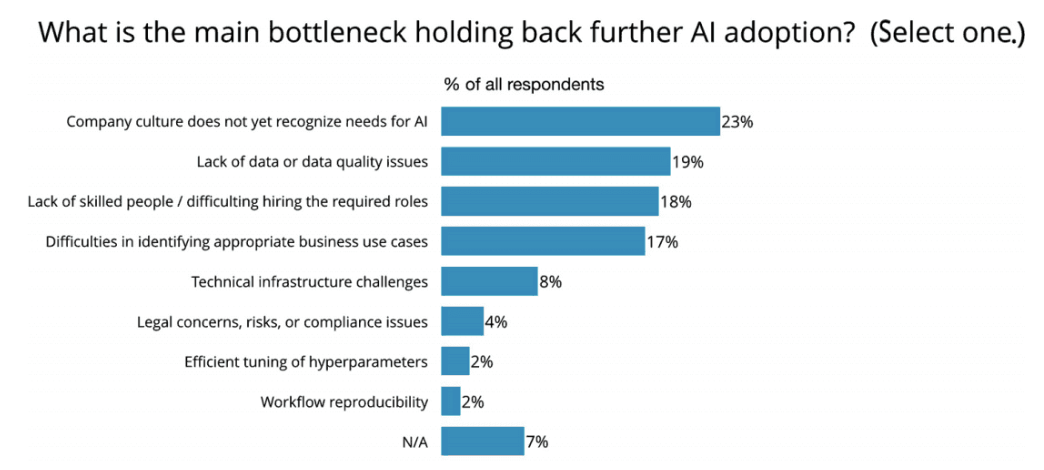Blog Post
Challenges you need to know about when applying AI in your business.

There is no doubt that Artificial Intelligence is used by an increasing number of businesses over the last few years and many of them are already experiencing its fruits. However, implementing this kind of technology is not an easy process and that’s why there are a lot of examples of businesses that cannot find their way into the AI landscape.
Recent research, conducted in 2019, revealed the most common issues and challenges that businesses face when they are in the process of adopting AI.
 1.
1.
Observing the table, 3 main issues are emerging which include several smaller challenges; Data, People, and Business Operations.
1. Data
Similar to humans assessing knowledge, AI learns from available information; data. Maybe a lot more than humans can process and with greater speed, but still the same process. Data, nowadays, is the “new gold” and most of the companies out there face challenges to mine it. Most of the enterprises have not yet understood that the most important element in building a successful AI system is…data! And like gold its quality is important.
The better the data you give it, the better the outcomes it will provide. In this process of collecting the data, businesses have to make sure to know the data they already possess, list the types and categories. Since you are aware of the data you have, the second step is data labeling. The challenge here arises from the common case of producing data every day, then you need a lot of people and time to label them.
Another challenge that emerges from your data is; bias. As we mentioned above AI acts based on the available data. But the available data derive from the opinions of others. And the opinion of others can be biased. Similarly, the way of collecting the data could be biased since it could not be representative of your entire population. So you need to constantly have in mind that AI is not error-free.
2. People
There are so many myths about AI, so many dystopian universes and so few crosschecked information about its applications. This, of course, results in people in managerial positions with no understanding of the AI landscape, its possibilities and limitations. Lack of knowledge hinders in many fields and it is common to result in devoting resources and efforts towards an unreachable goal. Thus, the first and most important step which is most probably the right answer in every situation is; education. Start with educating yourself and your employees about AI, explore what’s happening in the market and exploit every opportunity to learn.
3. Business Operations
Like every new and exciting business development activity, it needs a strategy. AI adoption demands a strategic approach including objectives, KPIs, ROI measurement. Following a clear strategy will give you the privilege of assessing and evaluating the results of your investment. Everyone understands your enthusiasm for having a brand new cooler than ever automatic chatbot handling some of your customer requests, but even this needs a strategic implementation.
Surpassing that, the integration of AI to your existing operations is not a simple process as well. In this stage, every business has a lot of factors that need to be addressed like data storage, labeling, feeding data to your system. However, if you follow a strategic approach from the beginning to the end the risk of falling is reduced.
At Pi School, over the last years, we have been part of amazing business transformations due to AI projects. The School of AI has delivered more than 55 projects for dozens of top-edge technology companies by hundreds of the brightest engineers from all over the world. If your company has a project, an idea or a vision that you believe could be approached using artificial intelligence we could have our best engineers working on it. Find out more here.
Table 1. Source: Ben Lorica & Paco Nathan “AI Adoption in the Enterprise”
-

Zoe Minogianni
Social Media Specialist